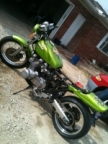1980 z1 classic , fuel injected 1000
- zelsdad
-
 Topic Author
Topic Author
- Offline
- User
- Posts: 25
- Thanks: 0
1980 z1 classic , fuel injected 1000
15 Sep 2012 15:05
THE HICK-UP PROBLEM IS SOLVED
THE BIKE HAS RAN FAST AND SOLID FOR TWO MONTHS , I AM SURE THAT FINDING ALL THE FILTERS AND EITHER RENEWING OR REMOVING HAS HELPED ,BUT THE OLD FEUL LINES , ALTHOUGH FINE UNDER STATIC INSPECTION , WERE COLLAPSEING UNDER FULL DRAW FROM THE ELECTRIC FUEL PUMP (100 PSI MAX) SHE RUNS !!!!!
THE BIKE HAS RAN FAST AND SOLID FOR TWO MONTHS , I AM SURE THAT FINDING ALL THE FILTERS AND EITHER RENEWING OR REMOVING HAS HELPED ,BUT THE OLD FEUL LINES , ALTHOUGH FINE UNDER STATIC INSPECTION , WERE COLLAPSEING UNDER FULL DRAW FROM THE ELECTRIC FUEL PUMP (100 PSI MAX) SHE RUNS !!!!!
Please Log in or Create an account to join the conversation.
- ramtough_63
-

- Offline
- User
- Posts: 2559
- Thanks: 132
Re: 1980 z1 classic , fuel injected 1000
15 Sep 2012 15:22
good catch congrats
1978 KZ1000 A2
Thrown Together To Ride Til Winter
Facebook Page
Free Range Custom Art
1982/83 750R/GPZ
1984 Goldwing 1200 Interstate
1982 Yamahopper QT50
Previous
2 79 HD sporty XLH
02 HD FLSTS Heritage
60's HD Hummer
70's Honda 550 Four
70 Yamaha 100
and various enduros dirtbikes minibikes...
Thrown Together To Ride Til Winter
Facebook Page
Free Range Custom Art
1982/83 750R/GPZ
1984 Goldwing 1200 Interstate
1982 Yamahopper QT50
Previous
2 79 HD sporty XLH
02 HD FLSTS Heritage
60's HD Hummer
70's Honda 550 Four
70 Yamaha 100
and various enduros dirtbikes minibikes...
Please Log in or Create an account to join the conversation.
- MFolks
-

- Offline
- User
- Posts: 6650
- Thanks: 540
Re: 1980 z1 classic , fuel injected 1000
15 Sep 2012 15:32
Especially if you're using any of the Ethanol gas. Read this:
Ethanol In Gasoline Problems (E-10, E-15, E-20, E-30, & E-85)
Certain materials commonly used with gasoline may be incompatible with high-level ethanol blends, causing them to degrade and contaminate the fuel. Metals that have been shown to degrade over time in the presence of high-level alcohol blends include brass,(floats & jets) lead, zinc(carb bodies) and lead-based solder.
Nonmetallic materials that degrade when in contact with ethanol include natural rubber, polyurethane, cork gasket material, leather, polyvinyl chloride (PVC) polyamides, and certain thermoplastic or thermoset polymers.
On the other hand, unplated steel, nickel-plated steel, stainless steel, black iron and bronze have shown resistance to ethanol corrosion, with nonmetallic materials like reinforced fiberglass, Buna-N, Neoprene rubber, polypropylene, nitrile rubber, Viton and Teflon meeting acceptable usage standards with E85.
1. Ethanol can break down resins and fillers in fiberglass gas tanks, causing them to leak.
2. Resins leached from fiberglass tanks can go through the fuel system, sticking to valves and other internal engine parts.
3.These deposits have caused bent pushrods and have clogged intake valves.
4.The alcohol attracts water, leading to increased corrosion in metal gas tanks.
5.Water in the fuel affects the octane and leads to knocking and decreased performance.
6.Ethanol acts as an efficient solvent, gradually cleaning out the accumulated gunk in fuel tanks and lines, and clogging carburetors.
7. Certain rubber gaskets and fuel lines are weakened by ethanol. Some rubber fuel lines may develop internal swelling, restricting the flow of gasoline. My understanding is the Silicone fuel lines resist the effects of Ethanol in gas.
8. The Ethanol in the gas has been reported to attack the glue used in gas filters, rendering them useless, as the paper filter medium is now coated with glue. It also softened the filter hose connection ends, causing possible failure.
9. Here’s a picture of an Ethanol softened fuel filter:
www.kzrider.com/forum/3-carburetor/54385...ine-visu-filter-junk
Ethanol In Gasoline Problems (E-10, E-15, E-20, E-30, & E-85)
Certain materials commonly used with gasoline may be incompatible with high-level ethanol blends, causing them to degrade and contaminate the fuel. Metals that have been shown to degrade over time in the presence of high-level alcohol blends include brass,(floats & jets) lead, zinc(carb bodies) and lead-based solder.
Nonmetallic materials that degrade when in contact with ethanol include natural rubber, polyurethane, cork gasket material, leather, polyvinyl chloride (PVC) polyamides, and certain thermoplastic or thermoset polymers.
On the other hand, unplated steel, nickel-plated steel, stainless steel, black iron and bronze have shown resistance to ethanol corrosion, with nonmetallic materials like reinforced fiberglass, Buna-N, Neoprene rubber, polypropylene, nitrile rubber, Viton and Teflon meeting acceptable usage standards with E85.
1. Ethanol can break down resins and fillers in fiberglass gas tanks, causing them to leak.
2. Resins leached from fiberglass tanks can go through the fuel system, sticking to valves and other internal engine parts.
3.These deposits have caused bent pushrods and have clogged intake valves.
4.The alcohol attracts water, leading to increased corrosion in metal gas tanks.
5.Water in the fuel affects the octane and leads to knocking and decreased performance.
6.Ethanol acts as an efficient solvent, gradually cleaning out the accumulated gunk in fuel tanks and lines, and clogging carburetors.
7. Certain rubber gaskets and fuel lines are weakened by ethanol. Some rubber fuel lines may develop internal swelling, restricting the flow of gasoline. My understanding is the Silicone fuel lines resist the effects of Ethanol in gas.
8. The Ethanol in the gas has been reported to attack the glue used in gas filters, rendering them useless, as the paper filter medium is now coated with glue. It also softened the filter hose connection ends, causing possible failure.
9. Here’s a picture of an Ethanol softened fuel filter:
www.kzrider.com/forum/3-carburetor/54385...ine-visu-filter-junk
1982 GPZ1100 B2
General Dynamics/Convair 1983-1993
GLCM BGM-109 Tomahawk, AGM-129A Advanced Cruise Missile (ACM)
General Dynamics/Convair 1983-1993
GLCM BGM-109 Tomahawk, AGM-129A Advanced Cruise Missile (ACM)
Please Log in or Create an account to join the conversation.
